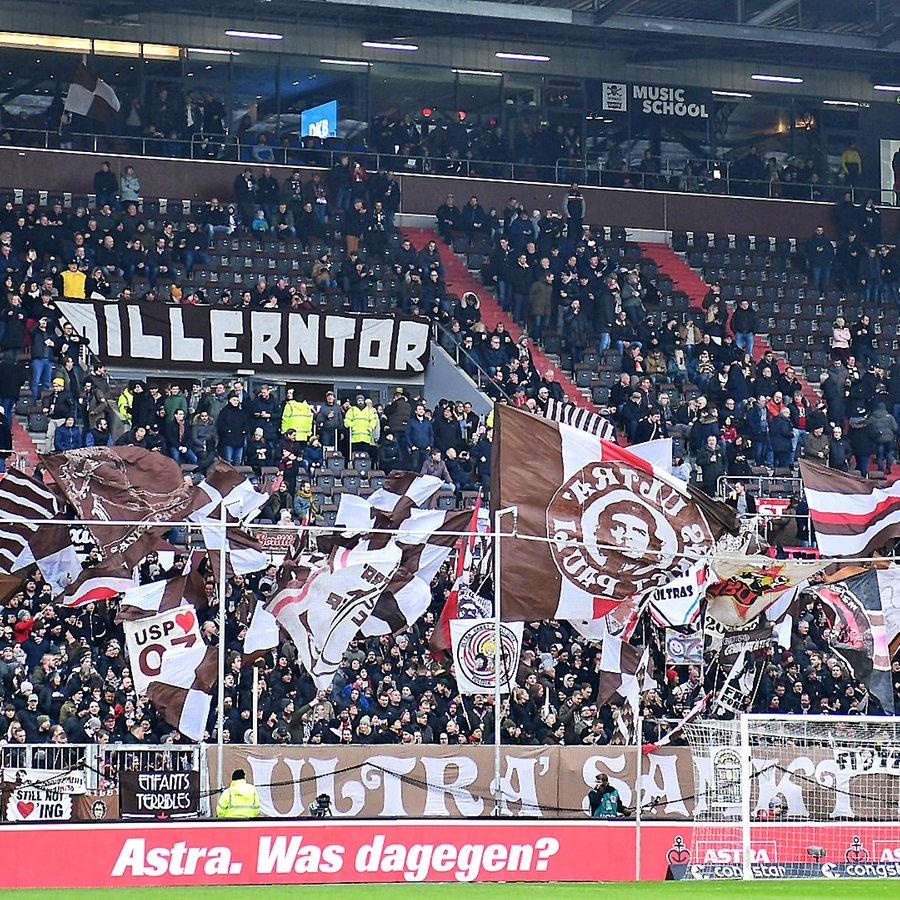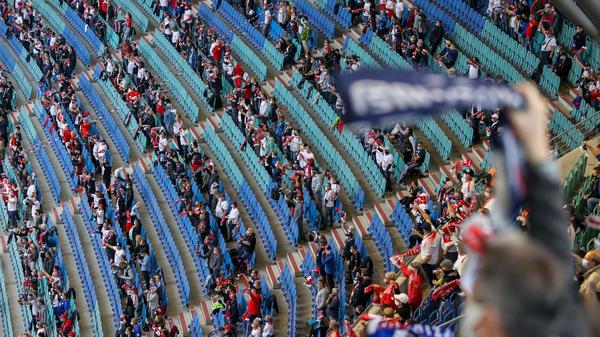The sports rights marketer SPORTFIVE, together with the research and consulting company Nielsen Sports, conducted a study to ask about the willingness of football fans in Germany to return to the stadium during the corona pandemic. As part of the survey, which took place in August, 1,000 fans between the ages of 16 and 69 were surveyed.
Four core theses can be derived from the study “Willingness to return to the stadium among football fans in Germany” and recommendations for action can be made. In order not to lose followers, the authors recommend providing information about hygiene measures and focusing even more on digital communication. The clubs must inspire former stadium-goers in particular to visit an event again. According to the study, it is to be feared that due to the corona pandemic, this group of fans will not return to the stadium in the medium and possibly long term.
1) The fans stay at home
Almost half of the representative respondents state that their interest in attending events has (rather) decreased (49 percent). Interest is at the same level among those interested in football (50 percent) and club fans (49 percent). 48 percent of former visitors to sporting events also state that they tend not to attend live events at first. For around half of these groups surveyed, the risk of contagion and infection is the main reason for their reluctance.
This reluctance also correlates significantly with age: According to current data, a longer reduction of around 20 to 30 percent of former stadium-goers must be expected. It should be emphasized here that the survey was carried out in the summer when the incidences were quite low. According to the study, only a minority (between 11 and 13 percent in the subgroups) have an increased interest in attending an event. The main driver is the long waiver. Those responsible at the clubs are asked to restore the traditional stadium experience in a timely manner and with as many traditional elements as possible - of course under the premise of a functioning hygiene concept that is communicated transparently.
According to SPORTFIVE, it wouldn't work without the traditional components of visiting the stadium. In addition to (the lost possibility) of spontaneous visits, this also includes the alcoholic stadium beer, the opening of standing room and the omission of the mask requirement as the simplest measures. Various Bundesliga clubs initially had to refrain from serving (alcoholic) beer or offering standing room due to local regulations. The professional clubs pursue different progressive concepts. In Leverkusen, Hamburg and Bremen, for example, they are already relying on a clearly communicated 2G regulation and hope that ultra groups will also show solidarity. In Mainz, the focus is on a "2Gplus" model, i.e. on "2G" in combination with "3G" in certain areas of the stadium.
2) Communication is everything
According to SPORTFIVE, the implementation and communication of hygiene concepts in the stadiums will be of central importance for the best possible spectator utilization.
More than 80 percent of fans expect comprehensive safety and hygiene concepts when returning to the stadium. Desired core elements of these hygiene concepts are:
The communication measures relating to the hygiene concepts are also of particular importance. 79 percent of fans state that they want to find out about hygiene and safety measures before visiting the stadium.
SPORTFIVE demands an understandable dialogue, because the fears and concerns of the fans must be taken seriously and understood. Mathias Bernhardt, Managing Director DACH of Nielsen Sports, also confirms this: “Long-Covid is not only relevant from a medical point of view. There are also long-term effects in the sports and entertainment sector due to Covid-19. Fortunately, social life is gradually returning to normal, but many fans have new fears and behavior patterns. Those responsible for the club must take these fears seriously and understand the individual fan needs in order to offer tailor-made solutions and a fan experience on site based on individual needs. This increases the chance that fans who have previously avoided returning to the stadium either because of concerns about possible Covid infection or because of new behavior patterns and pastimes since lockdown will also return to the stadium in the near future. At the same time, the sources of revenue in the areas of ticketing, hospitality, catering and merchandising, which were taken for granted before the pandemic, are also secured.”
According to the company, guest management and its communication can be strengthened at very short notice through infrastructural solutions such as ticket management tools integrated into hygiene concepts, which come into their own in the VIP area, but also in the public area. The sports business agency SPORTFIVE is currently working on an implementation for such a tool, with which VIP hospitality customers can initially administrate their guests digitally and at short notice. That would guarantee a higher utilization through the practical and short-term application for the stadium visitor. Even if personalization is mandatory, changes can still be made at short notice. Such a ticket management tool also opens up opportunities for club lead management. SPORTFIVE plans to make the tool available to interested clubs by the end of the year.

3) Fan loyalty is declining
Due to the reduction of the stadium experience in quantity (= fewer fans come) and quality (= visiting the stadium is only possible with restrictions), fan loyalty will also decrease in the future.
This thesis can only be partially derived from the available data (since only a cross-sectional study and not a long-term study). For the sports rights marketer, however, it seems logical and there are indications: around 20 to 30 percent of those who go to the stadium would say that they would not return to the stadium for the time being. According to the study, half of the former stadium-goers and also fans in general consider it (rather) unlikely to attend events with large numbers of spectators (over 1000 spectators) again.
Right from the start of the Corona crisis in March 2020, the stands in the stadiums were empty and ghost games were commonplace for months. With increasing vaccination rates and 2G or 3G guidelines, games in front of empty stands are a thing of the past - but the pandemic and its side effects are still on the minds of fans. The fear of infection remains present and the interest in major events is rather low. Corona is currently not the only problem in football, according to the researchers. Because the pandemic is playing its part in a possible negative development: the potentially declining interest in football in general, in being a fan and ultimately also in going to the stadium due to a weakening of the motivational driver “going to the stadium”, an increasingly media-only spread of football and the volume new entertainment segments that are particularly attractive to younger people.
Cologne: With the 2G regulation, the RheinEnergieSTADION, home of FC, can be fully utilized again. Image: StadionweltA fundamental problem is that the kick-off times are based on TV viewers and less on stadium-goers. For SPORTFIVE, German football is still faced with the crucial question: will it continue to be a media product - or will there be a regression to a stadium product? The clubs are in a comfortable position here, since the hybrid model made up of both products has worked well so far - and "further development will become more independent".
It is conceivable that development of clubs in one direction or the other will take place separately. In the future, the DFL as the umbrella organization and the majority of the current first division clubs will focus even more on TV viewers and act more with an international focus on reach, while the majority of second division clubs, due to a lack of alternatives and visibility, act more traditionally "culture-oriented" and act for the local stadium visitor, like SPORTFIVE. In the middle would be hybrid clubs that a) belong to the lower league due to their current sporting performance, but are in no way inferior to current Bundesliga clubs in terms of their tradition and existing range, or b) are currently in the highest league due to a longer-term, short-term sporting performance high Bundesliga would take place, but would have less to show in terms of reach or tradition.
4) Digitization is essential
Interest in digital live broadcasts of sporting events is very high - the figure for those interested in football is 75 percent. About half of club fans would also be willing to pay for digital content, albeit mostly only small amounts. Such alternatives appear to be important, especially for the group of people who no longer go to the stadium.
Without match days in the stadium, not only would significant sources of income be lost, but also important local networking opportunities. During this time, rights holders developed many interesting compensation concepts and ideas with fan groups, sponsors and business partners.
According to SPORTFIVE, the impulses from this have had a lasting effect on product developments and have produced some great cases. Digital products have been even more in focus since Corona. E-sport is currently of great importance, especially as a crisis winner of all sports in times of the global pandemic. Year after year, the European e-sports market was able to grow like the other continental hotspots - even in Corona year 2020, when e-sports championships filled the gaps in the unusual events from traditional sports. For the sports rights marketer, it is clear that many rights holders then also decided to market eSports. Borussia Dortmund would have taken various steps in the field of e-sports & gaming - mostly to have fun with the fans - and would have developed this into an e-football best case over the pandemic period.
Here you will find the complete representative study on the subject of “Readiness to return to the stadium among football fans in Germany”.
The Corona Pandemic was not easy for anyone - not even for the football world. That's why SPORTFIVE calls for clear communication between the clubs and their fans in order to create trust and security. But not only the classic stadium experience should be restored. Digital solutions would also have to be created in order to be prepared for another crisis if the worst came to the worst and to expand network and sales opportunities. (Stadium world, 04.11.2021)











Test winner at Stiftung Warentest:...
How to get the perfect look for Cos...
Dry elbows: This is how brittle ski...
Cream for Rosacea: The Best Creams